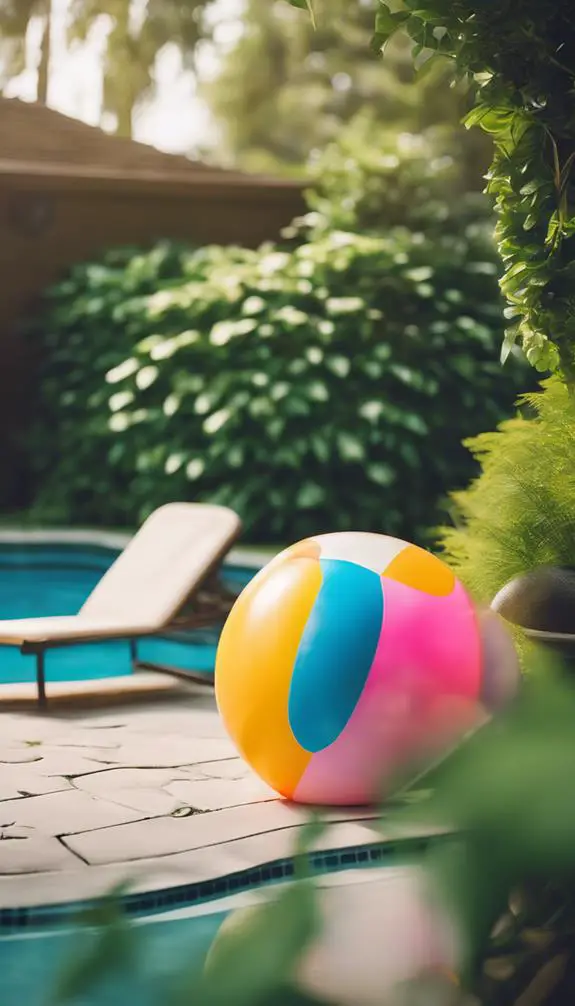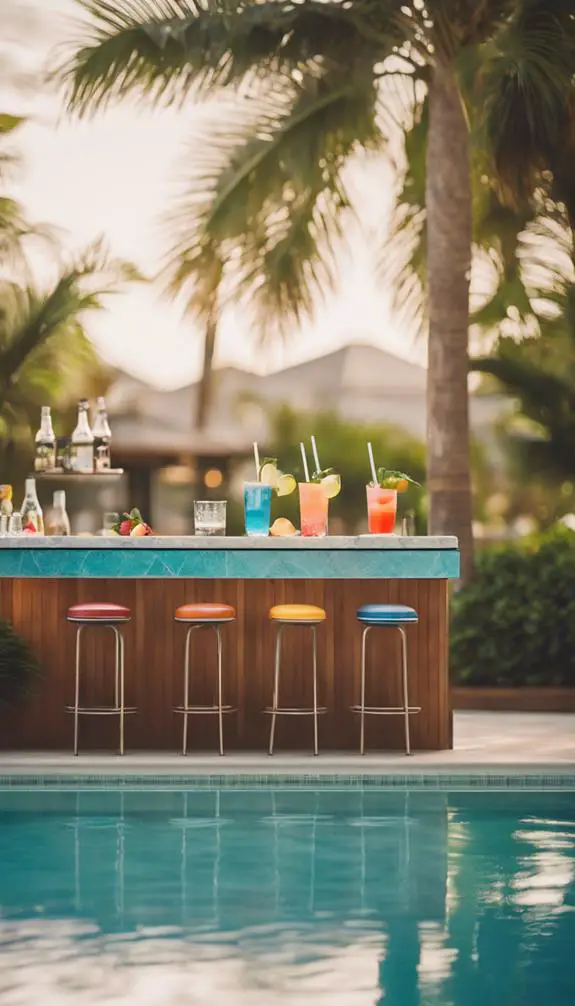As you prep your pool for the new season, you're likely thinking of ways to make maintenance easier, save money, and create a more enjoyable experience for you and your loved ones. You're not alone – many pool owners struggle with tedious cleaning tasks, high energy bills, and pesky algae growth. But what if you could simplify your routine, reduce chemical usage, and transform your pool area into a relaxing oasis? You're about to discover a collection of clever hacks that will do just that, and we're just getting started.
Summary
- Replace commercial cleaning products with DIY solutions using baking soda, vinegar, and lemon juice to reduce environmental footprint and save money.
- Prevent algae growth by maintaining a delicate mineral balance, regular water circulation, and balanced pH levels for crystal-clear water.
- Inspect and maintain pool filters regularly to ensure efficient performance, and consider upgrading to high-performance filters for reduced maintenance.
- Sanitize pool toys and accessories regularly to prevent the spread of germs and keep the pool area clean and healthy.
- Optimize pump schedules and reduce pump speed to minimize energy consumption and extend equipment lifespan, leading to significant cost savings.
DIY Pool Cleaning Solutions
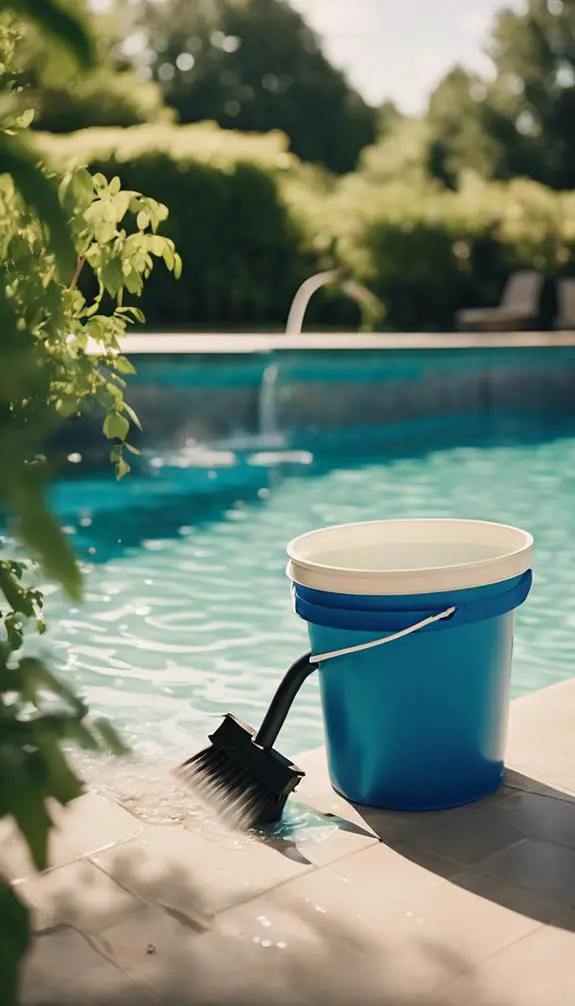
Across from the pool's sparkling surface, a cluttered shelf stocked with commercial cleaning products may be hindering your pursuit of a pristine pool.
Ditch the chemical-laden solutions and explore fresh solutions that won't break the bank. You can create homemade cleaners using everyday items like baking soda, vinegar, and lemon juice.
These natural ingredients are gentle on your pool's surfaces yet tough on dirt and grime. For instance, a mixture of baking soda and water creates a paste that effectively removes stubborn stains.
Meanwhile, a vinegar-based solution helps balance your pool's pH levels. By switching to DIY cleaning solutions, you'll not only reduce your environmental footprint but also save money on commercial products.
Natural Algae Prevention Methods

As you aim to maintain a pristine pool, you'll want to explore natural algae prevention methods that work in harmony with your pool's ecosystem.
By incorporating a mineral-rich water formula, you'll create an environment where algae struggles to thrive.
Next, you'll need to guarantee regular water circulation boosts and balanced pH levels, key components in your arsenal against algae growth.
Mineral Rich Water Formula
Formulating a mineral-rich water formula can revolutionize your pool maintenance routine by creating an environment inhospitable to algae growth.
By achieving a delicate mineral balance, you'll create an ecosystem where algae can't thrive. Imagine crystal-clear water that sparkles in the sunlight, rejuvenated and refreshed with every dip.
To craft this formula, you'll need to weigh factors like pH levels, calcium hardness, and alkalinity. A balanced blend of minerals like magnesium, potassium, and sodium will help maintain ideal water chemistry.
As you fine-tune your formula, you'll notice a significant reduction in algae growth, saving you time and money on maintenance. With a mineral-rich water formula, you'll be enjoying a pristine pool all season long.
Regular Water Circulation Boost
Circulating water regularly is key to preventing algae growth, as stagnant water creates an ideal breeding ground for these pesky organisms.
By optimizing your pool's water flow, you create circulation patterns that disrupt algae's ability to settle and thrive. You can achieve this by adjusting your pool's return jets to create a whirlpool effect, increasing water movement and circulation.
Additionally, consider installing a secondary circulation system, such as a booster pump, to further enhance water flow. This will guarantee that every corner of your pool receives adequate circulation, making it difficult for algae to gain a foothold.
Balanced Ph Levels Key
The pH levels in your pool water play a critical role in preventing algae growth, and maintaining a balanced pH is crucial for a healthy and thriving pool ecosystem.
You'll want to perform regular pH testing to verify your levels are within the ideal range of 7.2 to 7.8. If your pH levels are too high or too low, you'll need to perform pH balancing by adding the necessary chemicals to adjust the levels.
Proper pH balancing prevents algae growth, protects your pool equipment, and guarantees the effectiveness of your sanitizer. By maintaining a balanced pH, you'll create an environment where your sanitizer can work efficiently, keeping your pool water clean, clear, and safe for swimmers.
Filter Maintenance Made Easy

As you plunge into the world of pool maintenance, understanding how to keep your filter in top shape becomes crucial.
You'll want to perform regular Filter Inspections to guarantee your filter is running efficiently. Check for signs of wear and tear, clean or replace broken parts, and lubricate moving components.
Consider Filter Upgrades to improve performance and reduce maintenance. Upgrade to a high-performance filter or install a filter cleaning system to make maintenance a breeze.
Smart Pool Storage Ideas
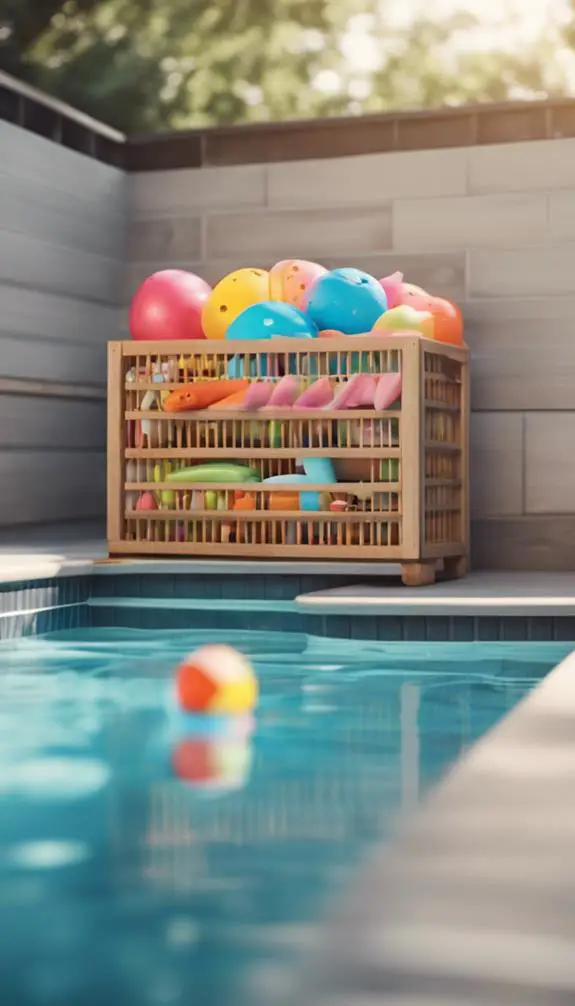
Five essential areas around your pool demand clever storage solutions to maintain a clutter-free oasis.
You need a place to stash pool toys, cleaning supplies, and other accessories. A pool cabinet with adjustable shelves and baskets can keep items organized and out of sight.
Install it near the pool pump to conceal unsightly equipment. Use storage baskets with lids to store pool noodles, floats, and other toys. Label each basket so you can quickly find what you need.
Consider a cabinet with a built-in countertop for convenient storage of pool test kits, cleaning supplies, and other essentials. By implementing these smart storage ideas, you'll create a more enjoyable and relaxing pool experience.
Reduce Chemical Usage Now
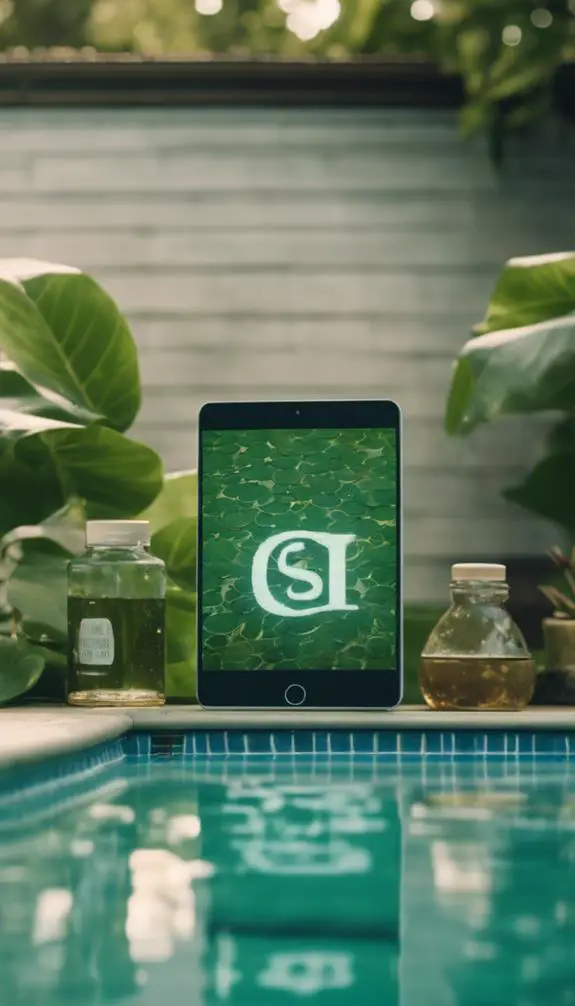
You're likely familiar with the pungent smell of chlorine and the sting of harsh chemicals in your eyes.
It's time to rethink your pool's chemical dependency. Implement chemical reduction strategies by introducing eco-friendly alternatives into your pool maintenance routine.
Consider switching to saltwater chlorine generators or bromine tablets, which are gentler on skin and eyes. You can also explore natural sanitizers like ozone generators or UV sanitizers, which minimize chemical usage while maintaining a clean and safe pool environment.
Simplify Pool Skimming Tasks

When you skim your pool regularly, you'll notice a significant reduction in stress and debris buildup.
By incorporating a few clever hacks into your routine, you can skim more efficiently and effectively, freeing up time for more enjoyable activities.
With the right tools and techniques, you'll be able to remove debris with ease, leaving your pool looking pristine and inviting.
Skim More, Stress Less
The pool's surface is a delicate balance of chemistry and clarity, and skimming plays a crucial role in maintaining this harmony.
You know that skimming is essential, but it can be a tedious task. To skim more and stress less, you need to Skim Faster and Skim Smarter.
Start by adjusting your skimmer's angle to match the water's flow, allowing it to glide effortlessly across the surface. Next, use a skimmer with a wider mouth to collect more debris in a single pass.
Easy Debris Removal
Easy Debris Removal (Simplify Pool Skimming Tasks)
Three key areas to focus on for easy debris removal are the pool's surface, the skimmer's design, and your cleaning routine.
You'll want to guarantee the pool's surface is smooth and even, allowing debris to float easily to the surface.
Next, consider upgrading to a skimmer with a wide mouth and adjustable flow control, making it easier to capture leaves and other debris.
Finally, implement a regular cleaning routine that incorporates innovative tools like debris magnets, which attract and trap debris, and floating vacuums that automatically collect floating debris.
Automatic Pool Cleaner Hacks
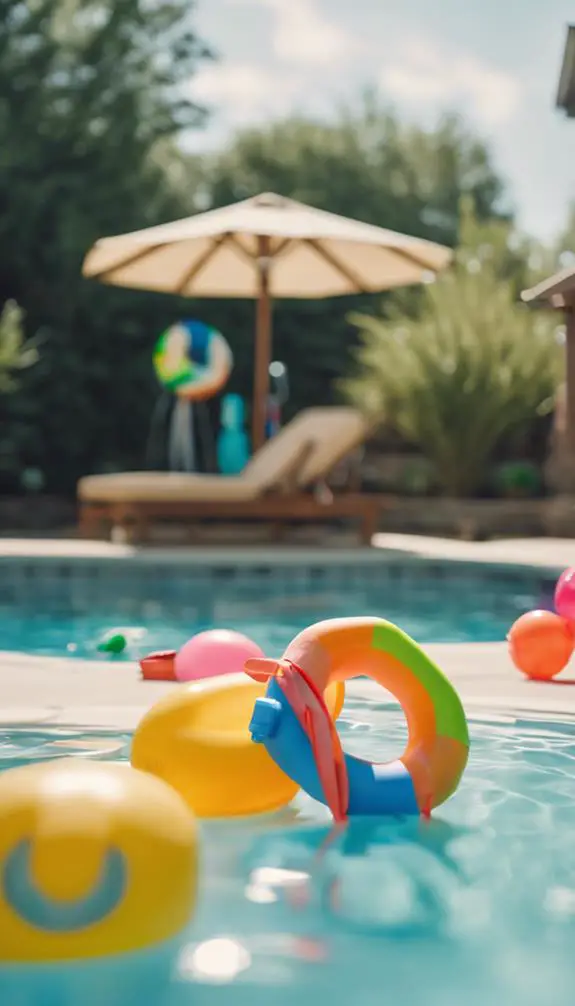
You're probably familiar with the convenience of automatic pool cleaners, but did you know these robots can be optimized for even better performance?
By adjusting the Cleaner Paths, you can guarantee your cleaner covers the entire pool floor efficiently. Try mapping out the Cleaner Routes to avoid repetitive passes and reduce cleaning time.
For example, set the cleaner to follow a zigzag pattern to cover more ground. You can also adjust the suction power to tackle stubborn dirt and debris.
Energy-Efficient Pumping Tips
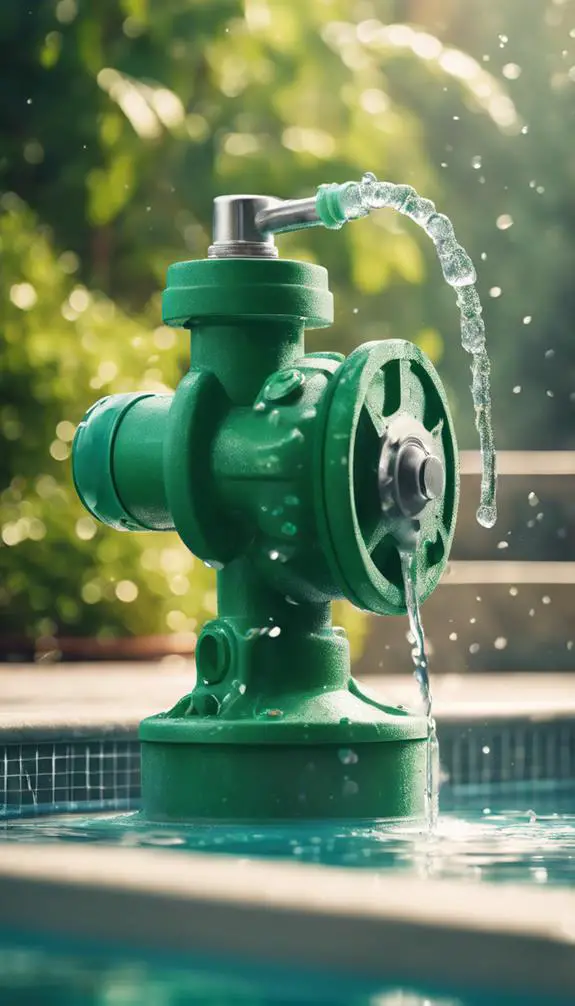
You can slash your pool's energy bill by fine-tuning your pump's operation.
Optimize Pump Schedules
One of the most substantial contributors to your pool's energy consumption is the pump, which can account for up to 70% of your pool's total energy usage.
By optimizing your pump schedule, you can notably reduce energy waste and save on your utility bills. You can do this by installing a pump timer app that allows you to program your pump to run during off-peak hours when electricity rates are lower.
Additionally, consider investing in an energy monitoring system that provides real-time data on your pool's energy consumption. This will help you identify areas of inefficiency and make data-driven decisions to optimize your pump schedule.
Reduce Pump Speed
Efficiency converges with innovation when it comes to reducing pump speed, a crucial aspect of energy-efficient pumping tips.
You can dramatically reduce energy consumption by optimizing your pump's speed. A slower pump speed translates to lower energy bills and extended equipment lifespan.
Consider installing a variable-speed pump, which allows you to adjust the speed according to your pool's specific needs. This upgrade can lead to substantial energy savings, often up to 80%.
Cleaning Pool Toys and Accessories
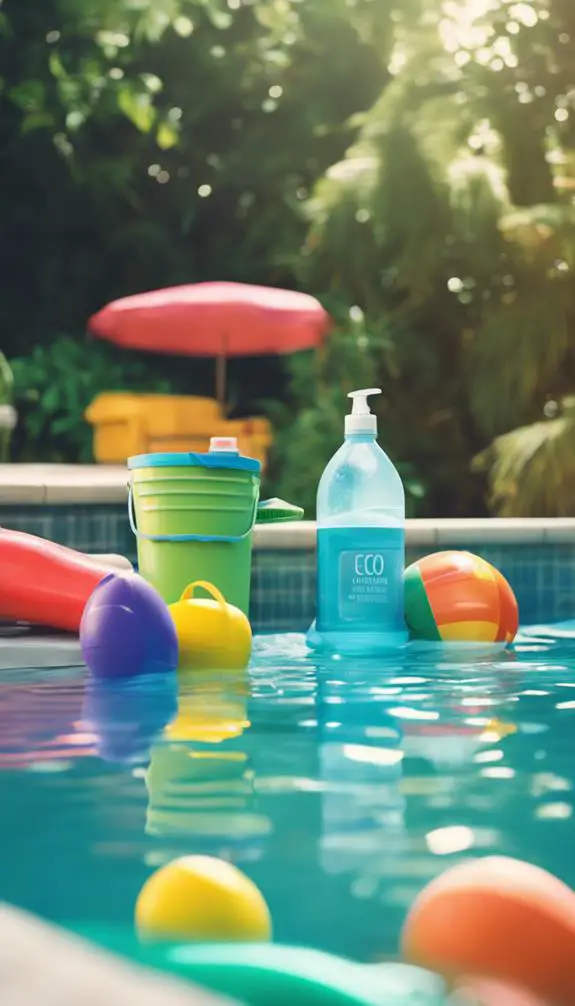
During those lazy summer days, pool toys and accessories are constantly being splashed, tossed, and dragged through the water, accumulating dirt, grime, and bacteria.
You need to sanitize them regularly to prevent the spread of germs and keep your pool area clean. Use Toy Sanitizers specifically designed for pool toys to kill 99.9% of bacteria and viruses.
For accessories like pool noodles, floats, and loungers, utilize Accessory Disinfectants that can effectively eliminate germs and mildew. Make sure to follow the product instructions and recommended dilution ratios for peak results.
Regular cleaning won't only keep your pool toys and accessories looking like new but also guarantee a safe and healthy swimming environment for you and your family.
Pool Cover Care and Maintenance

Inspecting your pool cover regularly is crucial to extending its lifespan and guaranteeing it continues to effectively protect your pool from debris and contaminants.
You'll want to check for signs of wear, such as cracks, fading, or brittleness, which can compromise the cover's integrity.
Different pool cover materials require specific care; for instance, vinyl covers need to be cleaned with a mild detergent and rinsed thoroughly, while mesh covers require a gentle scrub with a soft-bristled brush.
When winterizing your pool, make sure to properly clean and dry your cover before storing it to prevent mildew and damage.
Create a Poolside Oasis

How do you envision your ideal poolside retreat? A serene escape where you can relax and unwind, surrounded by lush greenery and soothing ambiance.
To create a poolside oasis, start by selecting Oasis decor that complements your pool's style and color scheme.
Add statement pieces like a statement umbrella or a fire pit to elevate the ambiance. Strategically place comfortable lounge chairs and sectionals to create cozy nooks.
Don't forget to incorporate natural elements like potted plants, a water feature, or a living wall to bring in a touch of nature.
Pool Water Testing Essentials
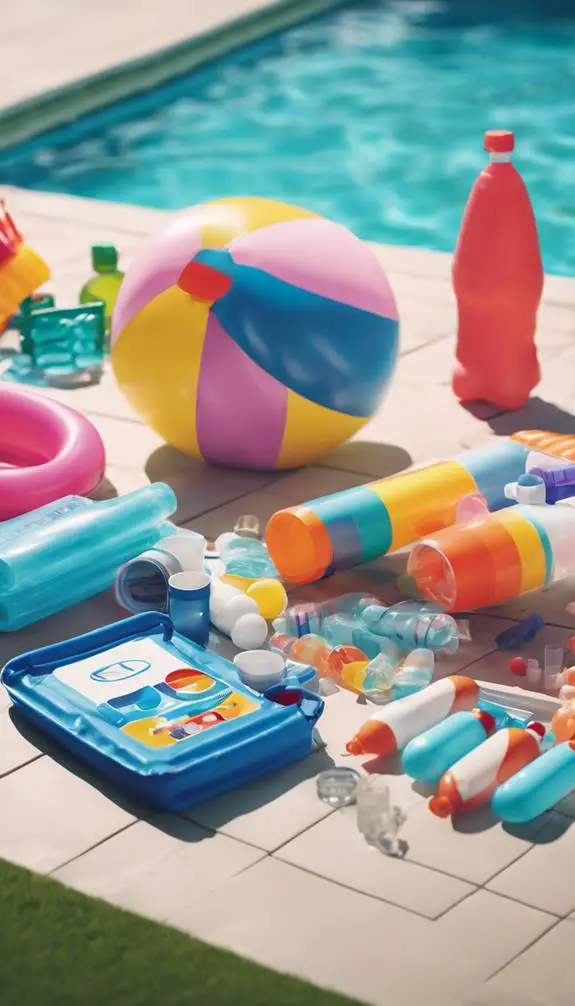
You need to test your pool water regularly to guarantee it's safe and healthy for swimmers, and to prevent damage to your pool and its equipment.
For peak Water Clarity, test your pool water at least twice a week, or daily if the pool gets heavy use. Pay attention to Test Frequency, as it's vital for maintaining a balanced chemical level.
Use a reliable test kit to check pH, alkalinity, calcium hardness, and chlorine levels. Visually inspect the water for cloudiness, algae growth, or unusual odors.
A well-maintained pool will sparkle with clarity, and its equipment will function efficiently. Stay on top of your pool's chemistry to guarantee a safe and enjoyable swimming experience.
Troubleshooting Common Issues
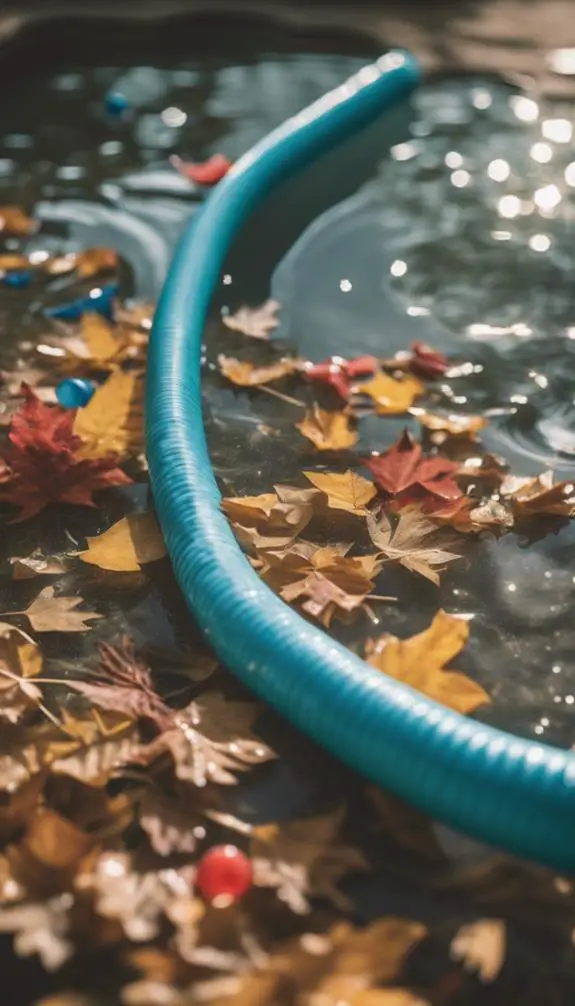
Cloudy water, algae blooms, and equipment malfunctions can quickly turn your backyard oasis into a nightmare.
When issues arise, you need to troubleshoot fast to prevent further damage. Start by inspecting your equipment, checking for signs of wear or corrosion.
Perform a leak detection test to identify any hidden leaks in your pipes. You can do this by turning off the pump and checking the pressure gauge – if it drops, you've got a leak.
Conduct a water loss investigation to determine where the leak is. Check the pool's return fittings, drain covers, and pipes for any signs of moisture or water damage.
Use a leak detection kit to pinpoint the source of the leak. Once you've identified the issue, you can take action to fix it and get your pool back to its sparkling best.
FAQs
Can I Use a Robotic Pool Cleaner With an Above-Ground Pool?
You can use a robotic pool cleaner with an above-ground pool, but you'll need to guarantee the robot's compatibility with your pool's shape, size, and liner type to achieve efficient cleaning and navigation.
How Often Should I Drain and Refill My Pool Water Completely?
You should drain and refill your pool water completely every 5-7 years, depending on water quality and pool maintenance habits, to prevent chemical buildup and maintain ideal sanitizer levels, ensuring a sparkling and healthy swimming environment.
Are There Any Pool Toys That Can Help With Pool Cleaning Tasks?
You'll find pool toys that double as cleaning tools, like pool skimmers that grab debris and floating cleaners that vacuum the floor, making maintenance a breeze and allowing you to enjoy your sparkling clean pool.
Can I Use a Pressure Washer to Clean My Pool Deck?
When power washing your pool deck, you'll effectively blast away dirt and grime, but be cautious not to damage surfaces; use a wide fan tip, keep the nozzle at least 12 inches away, and test on a small area first to guarantee deck cleaning success.
Do I Need to Winterize My Pool if I Live in a Warm Climate?
As you prep for winter, you're wondering if you need to winterize your pool in a warm climate. Climate checks reveal that even mild winters require winter prep to prevent damage, so yes, you should still take steps to protect your pool's plumbing and equipment.
Conclusion
You've now got the ultimate pool hack arsenal to transform your pool care routine! By implementing these game-changing tips, you'll enjoy a sparkling clean, safe, and inviting pool all season long while saving time, money, and energy. From DIY cleaning solutions to filter maintenance and eco-friendly alternatives, you're equipped to tackle any pool-related task with confidence. Plunge into a stress-free pool experience and make the most of your outdoor oasis!


